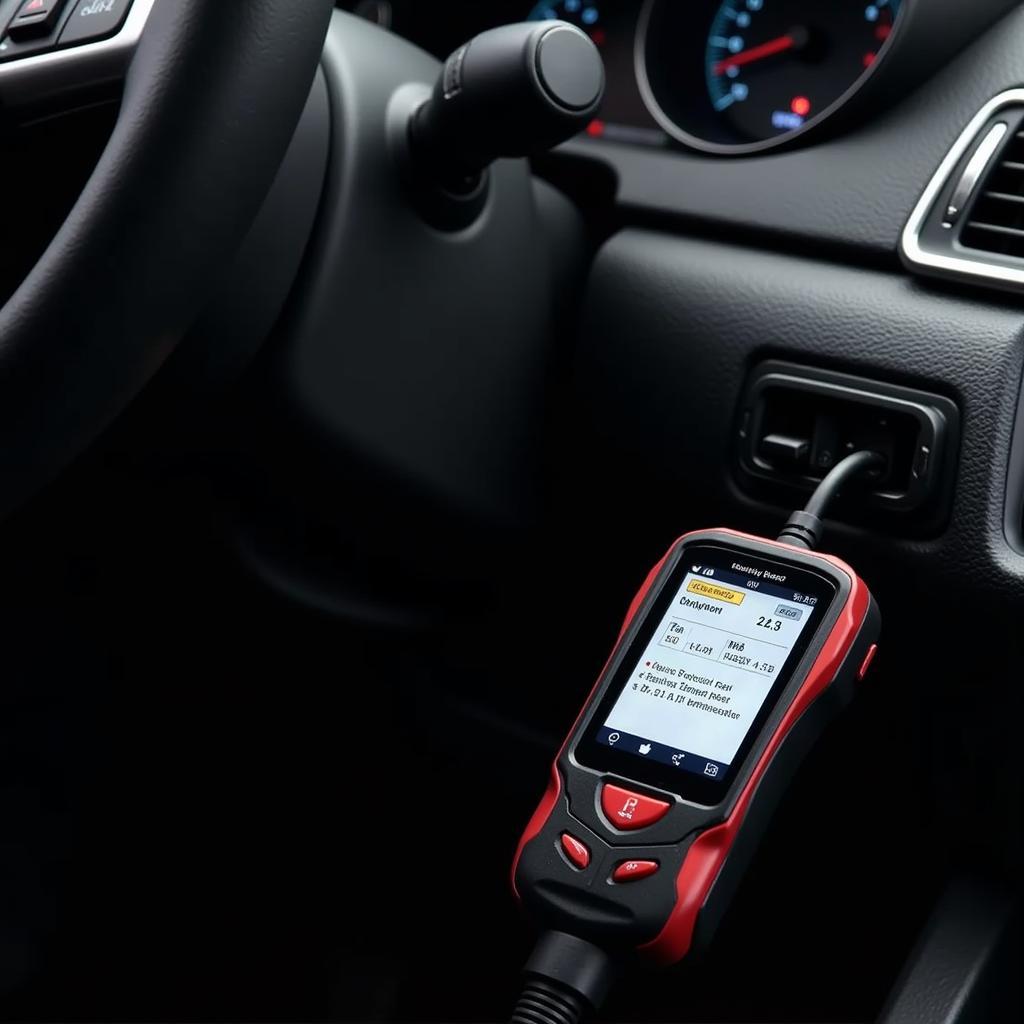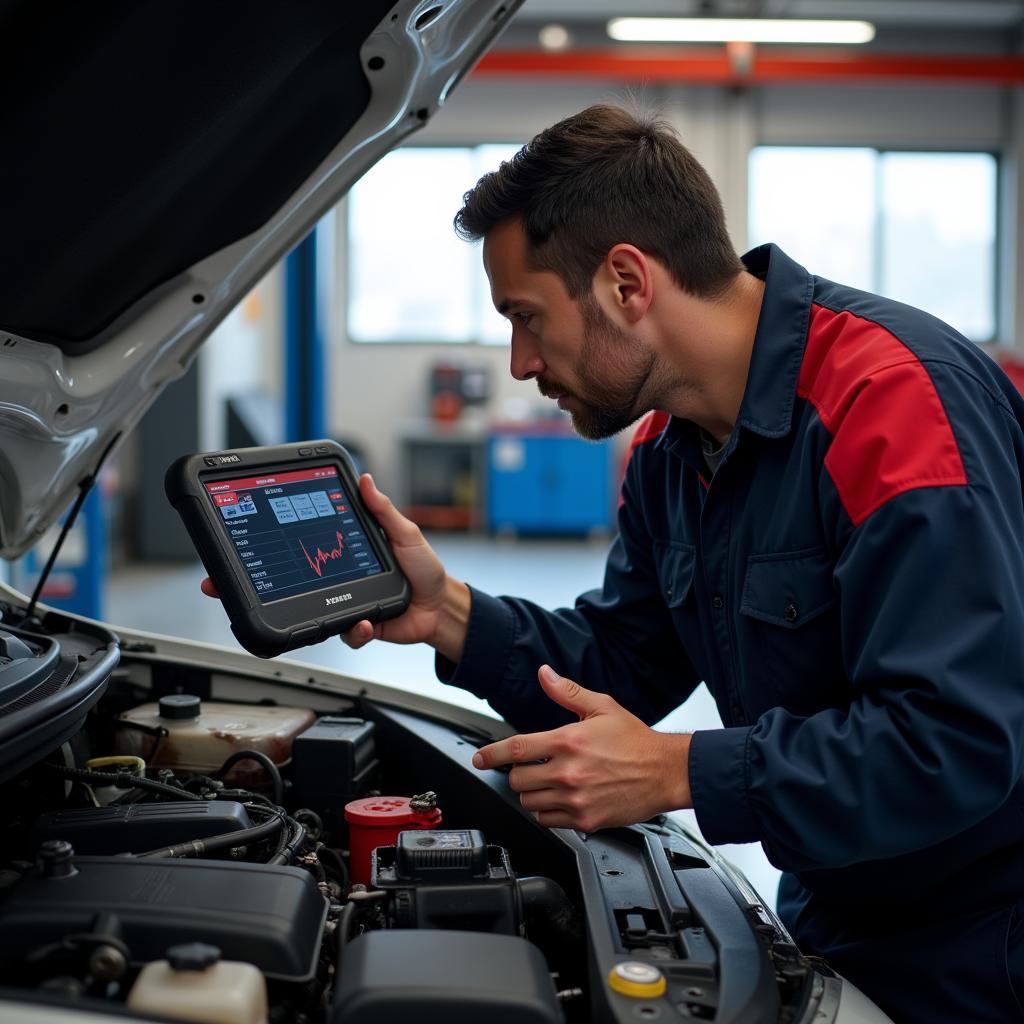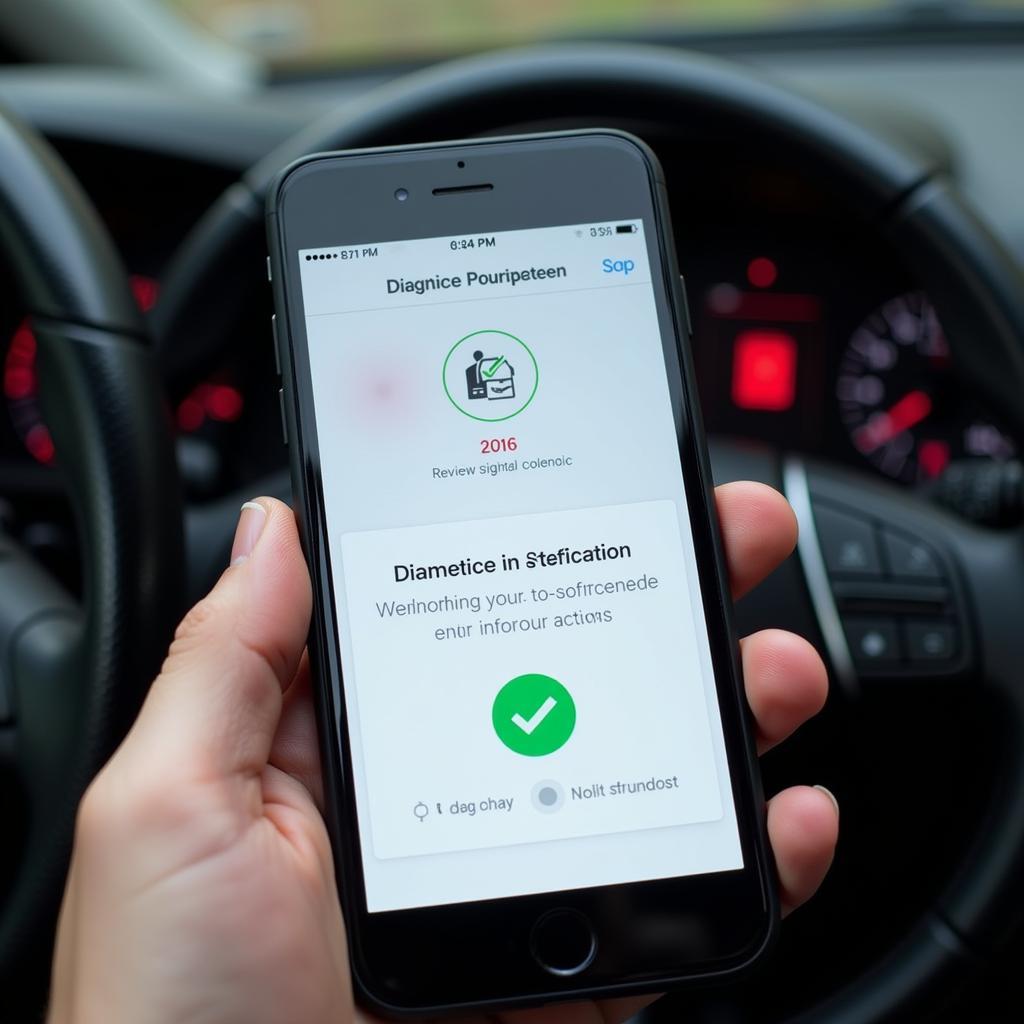A Diagnostic Car Device has become an essential tool for car owners and mechanics alike. Whether you’re a DIY enthusiast or a seasoned professional, understanding what a diagnostic car device is and how it can benefit you is crucial in today’s tech-driven automotive landscape.
 Diagnostic car device connected to a car’s OBD-II port
Diagnostic car device connected to a car’s OBD-II port
What is a Diagnostic Car Device?
Simply put, a diagnostic car device is a tool that allows you to communicate with your car’s computer system. It acts as a translator, deciphering the complex codes and data generated by your vehicle’s electronic control unit (ECU). This data can provide valuable insights into your car’s health, performance, and any potential issues that may arise.
Why You Need a Diagnostic Car Device
Gone are the days of relying solely on a mechanic’s intuition to diagnose car problems. Diagnostic car devices empower car owners with the knowledge to understand their vehicles better and make informed decisions about their maintenance. Here are just a few reasons why a diagnostic car device is a worthwhile investment:
- Identify and Clear Check Engine Lights: One of the most common uses of a diagnostic car device is to read and clear check engine lights. Instead of rushing to a mechanic for every illuminated warning, you can use the device to pinpoint the source of the problem yourself.
- Monitor Vehicle Performance: From engine RPM and coolant temperature to fuel efficiency and oxygen sensor readings, a diagnostic car device provides a wealth of real-time data that can help you monitor your car’s performance and identify potential issues before they become major problems.
- Save Money on Repairs: By diagnosing problems early on, you can potentially save yourself from costly repairs down the line. Knowing the exact issue also gives you leverage when negotiating with mechanics, ensuring you’re not being overcharged for unnecessary services.
- DIY Maintenance and Repairs: For the mechanically inclined, a diagnostic car device opens up a world of possibilities for DIY maintenance and repairs. You can use the device to perform tasks like resetting oil life monitors, calibrating sensors, and even programming new keys.
 Mechanic using a diagnostic device in a workshop
Mechanic using a diagnostic device in a workshop
Types of Diagnostic Car Devices
The market offers a wide array of diagnostic car devices, each with its own set of features and price points. Here’s a quick breakdown of the most common types:
- Basic Code Readers: As the name suggests, these devices are primarily designed to read and clear basic error codes. They are generally the most affordable option and are suitable for car owners who want a simple tool for basic diagnostics.
- OBD-II Scanners: These devices offer more advanced features than basic code readers, allowing you to access more detailed information about your car’s systems. They typically come with features like live data streaming, freeze frame data, and the ability to graph sensor data.
- Professional-Grade Scan Tools: These are the most sophisticated and expensive type of diagnostic car device. They are primarily used by professional mechanics and offer a comprehensive suite of features for diagnosing and repairing complex car problems.
Choosing the Right Diagnostic Car Device
With so many options available, choosing the right diagnostic car device for your needs can feel overwhelming. Consider the following factors when making your decision:
- Your Budget: Diagnostic car devices range in price from affordable to quite expensive. Set a budget beforehand to narrow down your options.
- Your Skill Level: If you’re a DIY beginner, a basic code reader or an OBD-II scanner will likely suffice. Professional mechanics, on the other hand, will need the advanced capabilities of a professional-grade scan tool.
- Your Car’s Make and Model: Not all diagnostic car devices are compatible with all car makes and models. Ensure that the device you choose is compatible with your vehicle before purchasing.
The Future of Car Diagnostics
The automotive industry is constantly evolving, and diagnostic car devices are keeping pace. As cars become increasingly sophisticated, we can expect to see even more advanced and user-friendly diagnostic tools in the future. These devices will likely incorporate features like:
- Cloud-based diagnostics: Allowing mechanics to remotely access and diagnose car problems from anywhere in the world.
- Predictive maintenance: Using artificial intelligence and machine learning to predict potential problems before they occur.
- Augmented reality: Overlapping diagnostic information onto a real-world view of the car, making it easier for mechanics to identify and repair issues.
 Smartphone displaying a car diagnostic app
Smartphone displaying a car diagnostic app
Conclusion
A diagnostic car device is no longer a luxury but a necessity for any car owner who wants to stay on top of their vehicle’s health and performance. From identifying simple error codes to unlocking a wealth of data about your car’s inner workings, these devices empower you with the knowledge to make informed decisions about your car’s maintenance and repairs. By investing in a diagnostic car device, you’re investing in the longevity and reliability of your vehicle.
FAQs
1. Will a diagnostic car device work on any car?
While most modern cars are equipped with an OBD-II port, it’s always best to check for compatibility with your specific car make and model before purchasing a diagnostic device.
2. Can I use a diagnostic car device to program my car keys?
Some advanced diagnostic car devices offer key programming capabilities, but this feature is typically found in professional-grade tools.
3. Are there any risks associated with using a diagnostic car device?
As long as you use the device responsibly and follow the manufacturer’s instructions, there are minimal risks involved.
4. Can I update the software on my diagnostic car device?
Many diagnostic car device manufacturers offer software updates to improve functionality and add new features.
5. Where can I purchase a diagnostic car device?
Diagnostic car devices are readily available online and at most auto parts stores.
Need help with your car diagnostic?
Contact us via WhatsApp: +1(641)206-8880, Email: [email protected]. We have a 24/7 customer support team.

Leave a Reply